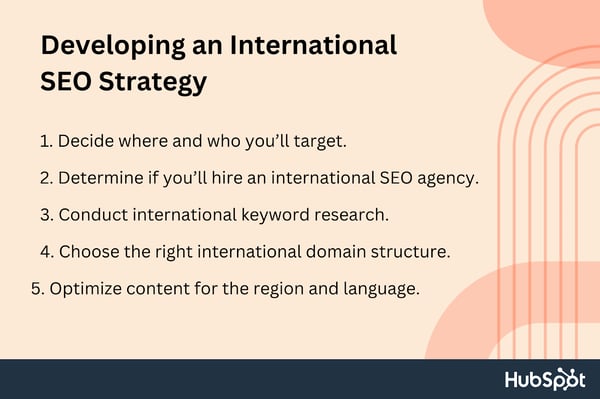Enhancing for the World: Learning International SEO Techniques
Enhancing for the World: Learning International SEO Techniques
Blog Article
Browsing the Digital Landscape: Leveraging International Search Engine Optimization for Cross-Border Success
In today's interconnected electronic globe, companies are increasingly looking past borders to touch into global markets. The intricacy of navigating the electronic landscape on an international range demands a nuanced strategy, from comprehending the fundamentals of International Search engine optimization to implementing geotargeting and multilingual key words methods.
Understanding International Search Engine Optimization Basics
Browsing the intricacies of global SEO requires a strong grasp of essential concepts to efficiently broaden on-line presence throughout boundaries. One critical element of international SEO is recognizing the value of localization. This involves customizing internet site material to fit the linguistic, cultural, and commercial differences of target audience. Key phrases must be not just converted but likewise adjusted to mirror just how individuals in different areas look for details.
Additionally, having a clear understanding of geo-targeting is vital. This includes showing to online search engine the certain countries or regions an internet site is targeting. Implementing hreflang tags is one way to connect this info, ensuring that the correct version of a web page shows up in the search results page for a customer in a particular place.
Furthermore, comprehending the impact of local search engines and social networks platforms is crucial for international SEO success. While Google is dominant in several areas, nations like China have their very own search engines like Baidu, calling for tailored methods for each platform to optimize on-line exposure (International SEO).

Targeting Multilingual Search Phrase Strategies
Developing multilingual search phrase techniques is crucial for properly reaching diverse international audiences and making the most of on-line exposure throughout various etymological regions. When targeting multilingual keyword approaches, it is critical to perform extensive research to understand the particular search terms and phrases used by the target audience in each linguistic region. This entails not only translating key words but likewise considering cultural nuances, regional dialects, and search fads special to every target market.
To develop a successful multilingual key words strategy, it is vital to prioritize importance and search intent. Search phrases must line up with the material on the web site and reverberate with the cultural context of the target market. Making use of tools such as Google Search Phrase Planner, SEMrush, or Ahrefs can help identify high-performing key words in different languages and examine their search volume and competition level.
Moreover, tracking and analyzing the performance of multilingual key words frequently is necessary for enhancing and fine-tuning the technique in time. By continually adapting to reference adjustments in search actions and trends, businesses can improve their online presence and attract even more worldwide web traffic to their internet sites.
Implementing Geotargeting and Hreflang Tags
When intending to improve worldwide search engine optimization techniques, incorporating geotargeting and hreflang tags is crucial for maximizing website visibility across different regions. Geotargeting includes customizing material to specific places, ensuring that customers in different areas receive relevant info. By implementing geotargeting, services can improve their local search rankings and bring in region-specific web traffic.

Optimizing Internet Site Structure for Worldwide Exposure
To additionally boost worldwide SEO techniques past geotargeting and hreflang tags, optimizing the web site structure is critical for attaining global exposure and optimizing reach across different regions. A well-structured website not only enhances user experience but also helps with search engine crawlers in recognizing the web content and context of the website.
Furthermore, producing language-specific subdirectories or subdomains can assist look engines supply the ideal version of the internet site to individuals based upon their language choices, even more enhancing the general user experience. In addition, enhancing link frameworks to consist of pertinent key words and geotargeted terms can enhance the site's presence in different areas. By structuring check this site out the internet site properly for international target markets, businesses can boost their possibilities of drawing in international website traffic and broadening their reach across borders.

Tracking and Evaluating Cross-Border Efficiency
Efficient tracking and studying of cross-border efficiency is crucial for reviewing the success of global SEO strategies and recognizing possibilities for improvement in global reach and visibility. By carefully tracking essential efficiency indicators (KPIs) throughout different markets, services can obtain important insights into the efficiency of their cross-border SEO initiatives. Keeping track of metrics such as organic web traffic, keyword positions, conversion rates, and bounce prices can give a thorough sight of how well a website is performing in numerous areas.
By contrasting efficiency across different nations, regions, or languages, firms can determine effective techniques and localize web content to better cater to specific target audiences (International SEO). Regular analysis of SEO performance on a worldwide range makes sure that companies can adjust their methods quickly to utilize on emerging chances and keep a competitive edge in worldwide markets.
Conclusion
In conclusion, global search engine optimization plays a crucial duty in attaining cross-border success by enhancing web sites for worldwide exposure, targeting multilingual keyword phrase techniques, carrying out geotargeting and hreflang tags, and keeping an eye on cross-border efficiency. By understanding the basics of international SEO and enhancing website structures as necessary, businesses can properly reach and engage with their target market across various areas and languages. This strategic method is vital for expanding market reach and driving online growth in today's digital landscape.
Report this page